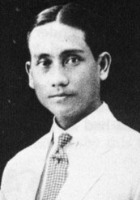José Corazón de Jesús
José Corazón de Jesús Poems
If I go blind, I will follow you
by the sound of your voice alone,
in your throat there is a sound
more golden and unique among all things.
...
José Corazón de Jesús Biography
José Corazón de Jesús, also known by his pen name Huseng Batute, was a Filipino poet who used Tagalog poetry to express the Filipinos' desire for independence during the American occupation of the Philippines, a period that lasted from 1901 to 1946. He is best known for being the lyricist of the Filipino song Bayan Ko. Buhay Huseng Batute was born on November 22, 1896 in Santa Cruz, Manila to Vicente de Jesús, the first health bureau director of the American occupation government, and Susana Pangilinan of Pampanga. He was christened José Cecilio de Jesús but he later dropped Cecilio and replaced it with the Spanish name Corazón (heart) because he said it best described his character. Early Life De Jesús spent his childhood in Santa Maria, Bulacan, his father's hometown. He completed his education at the defunct Liceo de Manila, where he graduated in 1916. His first published poem was Pangungulila (Yearning), which was published in the defunct Ang Mithi (The Ideal) in 1913 when he was 17 years old. Newspaper Poet In 1920, de Jesús received his bachelor of laws degree from the defunct Academia de Leyes but he never practiced his legal profession because he was already busy writing a column in verse for the Tagalog newspaper Taliba. The column was called Buhay Maynila (Manila Life) which he wrote under the pseudonym Huseng Batute. Through his column, he satirized society under the American colonizers and espoused independence for the Philippines which was then a commonwealth under the United States. De Jesús published some 4,000 poems in his Buhay Maynila column. He also wrote about 800 columns under the title Ang Lagot na Bagting (The Broken String). Although his favored pen name was Huseng Batute, he also wrote about 300 short poems and prose works under several pseudonyms, such as Pusong Hapis, Paruparu, Pepito Matimtiman, Mahirap, Dahong Kusa, Paruparong Luksa, Amado Viterbi, Elias, Anastacio Salagubang and Water Lily. King of the Balagtasan On March 28, 1924, de Jesús and other leading Tagalog writers met at a women's school in Tondo, Manila, under the auspices of Filipino educator Rosa Sevilla, to discuss how to celebrate the birth anniversary of Tagalog poet Francisco Balagtas on April 2. They decided to hold a traditional duplo, or a dramatic debate in verse that was in its waning days in the 1920s. They changed the format of the duplo and renamed it balagtasan in honor of Balagtas. There were three pairs of poets who participated in the first balagtasan on April 6, 1924 at the defunct Instituto de Mujeres (Women's Institute), founded by Sevilla, but the audience were most impressed by de Jesús and another Filipino poet, Florentino Collantes. The balagtasan was an instant hit, later becoming became a common feature in Manila's biggest and most expensive theaters until the 1950s. De Jesús and Collantes were pitted against each other in a contrived rivalry and a showdown was set for Oct. 18, 1925 at the Olympic Stadium. De Jesús was acclaimed winner of the showdown and was dubbed "Haring Balagtasan" (king of versified debate). He held the title until his death in 1932. Contribution to the Spread of Balagtasan De Jesús, who was already famous around the Philippines as Huseng Batute, was asked in 1930 to act in the movie Oriental Blood, which starred Atang dela Rama and Carmen Rosales, the most famous actresses of the day, and his own son, José Corazón de Jesús, Jr., who would later gain some fame as a silent movie actor. De Jesús contracted an ulcer during the filming of Oriental Blood and died of ulcer complications on May 26, 1932. He was survived by his wife Asunción Lacdan de Jesús and children Teresa, José Jr., and Rogelio. Upon his death, his heart was donated to a government museum where it was preserved until it was buried with his mother. He was finally interred at the Manila North Cemetery where he was buried under a tree, as he wished in his poems Isang Punong Kahoy (One Tree) and Ang Akasya (The Acacia). Many of his descendants now live in the United States, carrying on the family name of de Jesús.)
The Best Poem Of José Corazón de Jesús
More To Come
If I go blind, I will follow you
by the sound of your voice alone,
in your throat there is a sound
more golden and unique among all things.
If I go deaf, my entire being
will converse with your eyes alone,
in your every look I will conjure
all the words you want to say.
If I go deaf and blind and there’s nothing more
in the world for me to see,
I will follow your scent if that’s all that’s left,
I will let my nose do all my loving.
Even if you hide, the wind will deliver to me
your every gesture that overflows with poetry.
In the dried grass I will trace your footprints
like perfume that someone has spilled.
Without perfume or radiance or voice
to whom I can pledge my love
your very presence is enough to make me feel
you will yet draw near.
I may go blind but only come close
to the chords of my heart full of longing,
I know you by your footfall, my love,
and I am filled with so much poetry.
